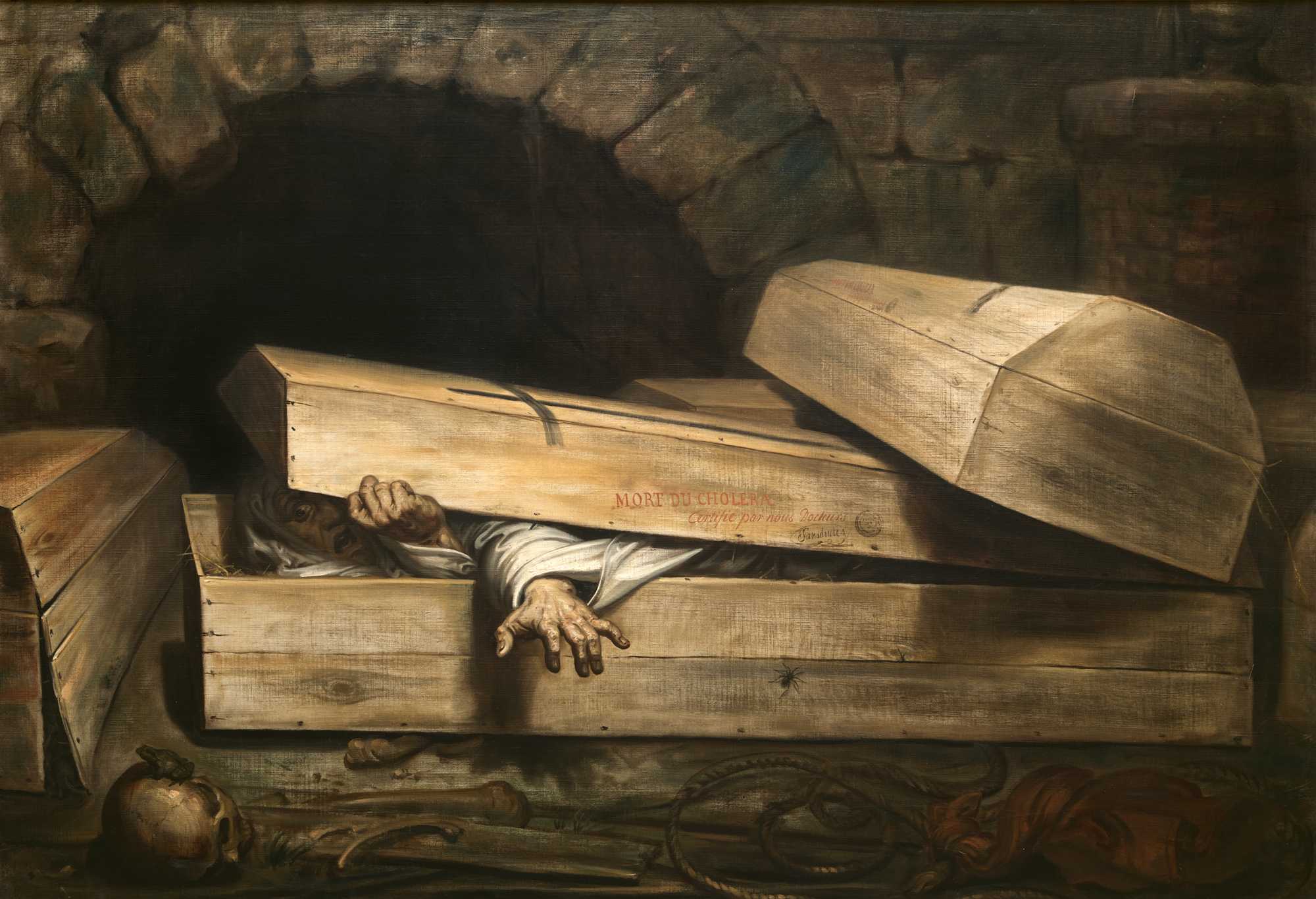|
Dead Ringer (idiom)
Dead ringer is an idiom in English. It means "an exact duplicate" or "100% duplicate", and derives from 19th-century horse-racing slang for a horse presented "under a false name and pedigree"; "ringer" was a late nineteenth-century term for a duplicate, usually with implications of dishonesty, and "dead" in this case means "precise", as in "dead centre". Citing the '' Manitoba Free Press'', October 1882. The term is sometimes said to derive, like "saved by the bell", from a custom of providing a cord in coffins for someone who has been buried alive to ring a bell to call for help, but this appears to be a folk etymology Folk etymology (also known as popular etymology, analogical reformation, reanalysis, morphological reanalysis or etymological reinterpretation) is a change in a word or phrase resulting from the replacement of an unfamiliar form by a more famili .... References English-language idioms {{vocab-stub ... [...More Info...] [...Related Items...] OR: [Wikipedia] [Google] [Baidu] |
Idiom
An idiom is a phrase or expression that typically presents a figurative, non-literal meaning attached to the phrase; but some phrases become figurative idioms while retaining the literal meaning of the phrase. Categorized as formulaic language, an idiom's figurative meaning is different from the literal meaning. Idioms occur frequently in all languages; in English alone there are an estimated twenty-five million idiomatic expressions. Derivations Many idiomatic expressions were meant literally in their original use, but sometimes the attribution of the literal meaning changed and the phrase itself grew away from its original roots—typically leading to a folk etymology. For instance, the phrase "spill the beans" (meaning to reveal a secret) is first attested in 1919, but has been said to originate from an ancient method of voting by depositing beans in jars, which could be spilled, prematurely revealing the results. Other idioms are deliberately figurative. For example, "break ... [...More Info...] [...Related Items...] OR: [Wikipedia] [Google] [Baidu] |
Manitoba Free Press
The ''Winnipeg Free Press'' (or WFP; founded as the ''Manitoba Free Press'') is a daily (excluding Sunday) broadsheet newspaper in Winnipeg, Manitoba, Canada. It provides coverage of local, provincial, national, and international news, as well as current events in sports, business, and entertainment and various consumer-oriented features, such as homes and automobiles appear on a weekly basis. The WFP was founded in 1872, only two years after Manitoba had joined Confederation (1870), and predated Winnipeg's own incorporation (1873). The ''Winnipeg Free Press'' has since become the oldest newspaper in Western Canada that is still active. Though there is competition, primarily with the print daily tabloid ''Winnipeg Sun'', the WFP has the largest readership of any newspaper in the province and is regarded as the newspaper of record for Winnipeg and the rest of Manitoba. Timeline November 30, 1872: The ''Manitoba Free Press'' was launched by William Fisher Luxton and John A. Ken ... [...More Info...] [...Related Items...] OR: [Wikipedia] [Google] [Baidu] |
Premature Burial
Premature burial, also known as live burial, burial alive, or vivisepulture, means to be buried while still alive. Animals or humans may be buried alive accidentally on the mistaken assumption that they are dead, or intentionally as a form of torture, murder, or execution. It may also occur with the consent of the victim as a part of a stunt, with the intention to escape. Fear of being buried alive is reported to be among the most common phobias. Physiology Premature burial can lead to death through the following: asphyxiation, dehydration, starvation, or (in cold climates) hypothermia. A person trapped with fresh air to breathe can last a considerable time and burial has been used as a very cruel method of execution (as in cases of Vestal Virgins who violated the oath of celibacy), lasting sufficiently long for the victim to comprehend and imagine every stage of what is happening (being trapped in total darkness with very limited or no movement) and to experience great psych ... [...More Info...] [...Related Items...] OR: [Wikipedia] [Google] [Baidu] |
Folk Etymology
Folk etymology (also known as popular etymology, analogical reformation, reanalysis, morphological reanalysis or etymological reinterpretation) is a change in a word or phrase resulting from the replacement of an unfamiliar form by a more familiar one. The form or the meaning of an archaic, foreign, or otherwise unfamiliar word is reinterpreted as resembling more familiar words or morphemes. The term ''folk etymology'' is a loan translation from German language, German ''Volksetymologie'', coined by Ernst Förstemann in 1852. Folk etymology is a Productivity (linguistics), productive process in historical linguistics, language change, and social relation, social interaction. Reanalysis of a word's history or original form can affect its spelling, pronunciation, or meaning. This is frequently seen in relation to loanwords or words that have become archaic or obsolete. Examples of words created or changed through folk etymology include the English dialectal form wikt:sparrowgrass ... [...More Info...] [...Related Items...] OR: [Wikipedia] [Google] [Baidu] |


